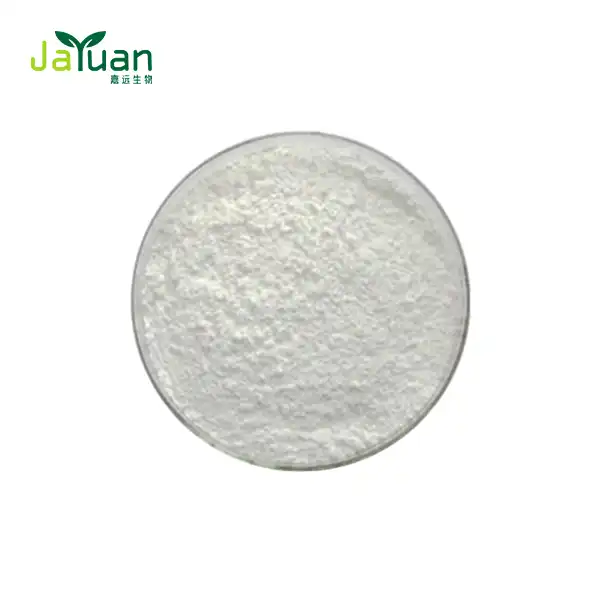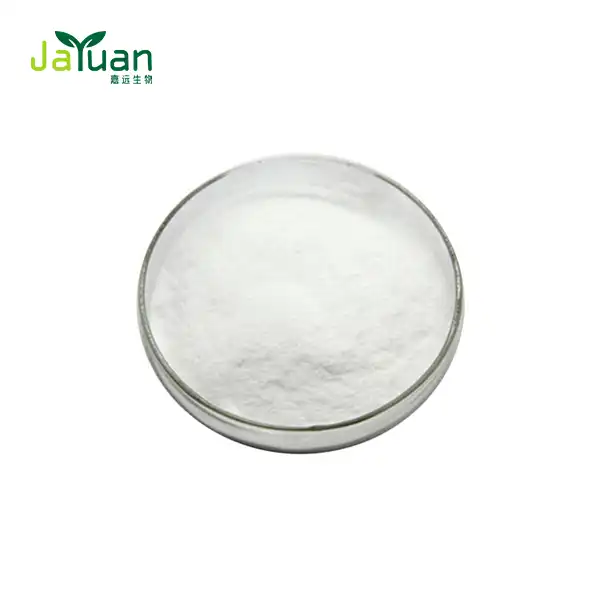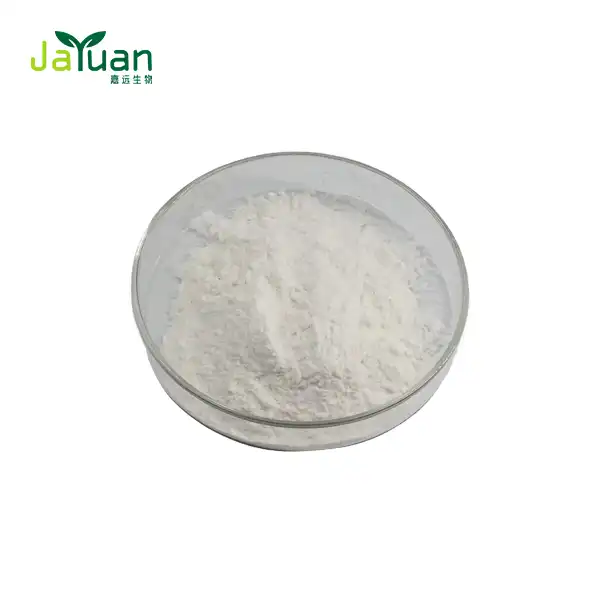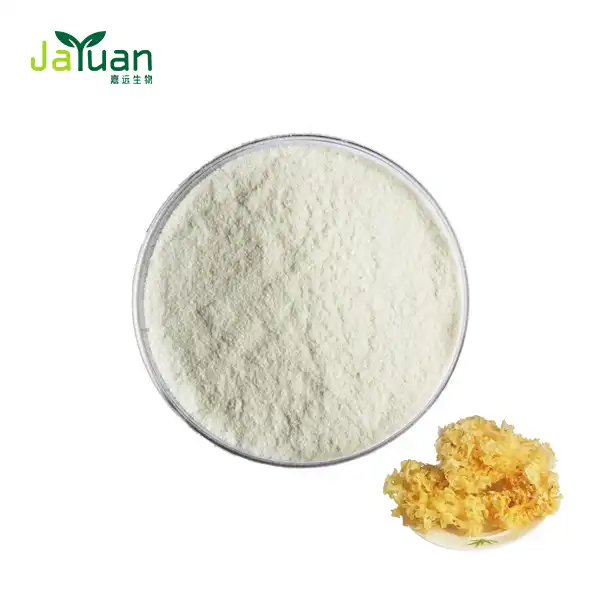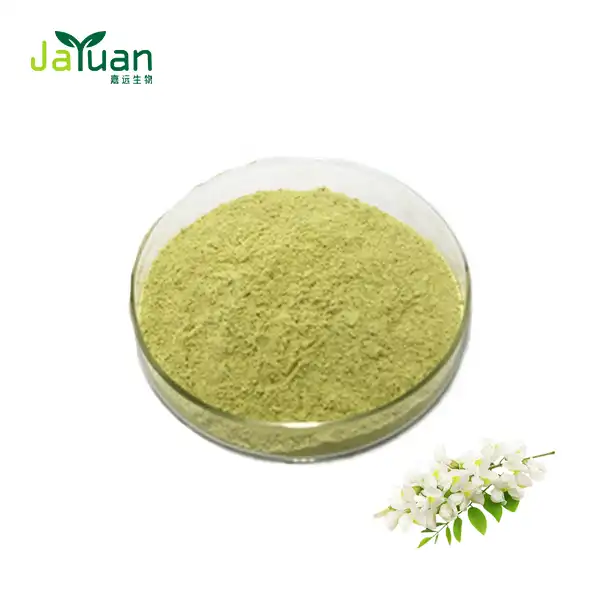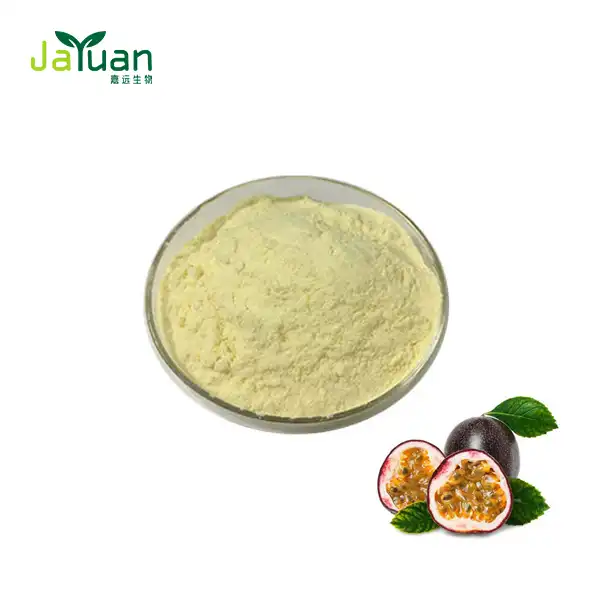Luteolin Powder in Anti-Inflammatory Treatments
Inflammation is a natural bodily response to injury or infection, but when it becomes chronic, it can lead to a host of health issues. Enter luteolin, a powerful flavonoid found in various plants that has garnered attention for its potential anti-inflammatory properties. In this article, we'll explore the role of luteolin powder in combating inflammation and its promising applications in treating chronic inflammatory conditions.

The Role of Luteolin in Reducing Inflammation
Luteolin, a yellow crystalline compound belonging to the flavonoid family, has been the subject of numerous studies for its remarkable anti-inflammatory properties. This naturally occurring substance can be found in a variety of fruits, vegetables, and herbs, but it's also available as a concentrated pure luteolin powder for those seeking to harness its benefits more directly.
At the molecular level, luteolin works by inhibiting various inflammatory pathways in the body. It has been shown to suppress the production of pro-inflammatory cytokines, which are signaling molecules that promote inflammation. By interfering with these pathways, luteolin can help mitigate the inflammatory response and potentially alleviate associated symptoms.
Moreover, luteolin exhibits potent antioxidant properties. This means it can neutralize harmful free radicals in the body, which are often implicated in chronic inflammation and oxidative stress. By combating these destructive molecules, luteolin may help protect cells from damage and reduce overall inflammation levels in the body.
Luteolin's Impact on Chronic Inflammatory Diseases
The anti-inflammatory effects of luteolin make it a promising candidate for managing various chronic inflammatory conditions. Research has shown that luteolin powder may be beneficial in addressing several health issues:
Arthritis
Luteolin has demonstrated potential in reducing joint inflammation associated with rheumatoid arthritis and osteoarthritis. Studies suggest that it may help inhibit the production of inflammatory mediators in joint tissues, potentially alleviating pain and improving mobility for arthritis sufferers.
Cardiovascular Disease
Chronic inflammation is a key factor in the development of cardiovascular diseases. Luteolin's anti-inflammatory and antioxidant properties may help protect against atherosclerosis, the buildup of plaque in arteries that can lead to heart attacks and strokes.

Neurological Disorders
Emerging research indicates that luteolin may have neuroprotective effects, potentially benefiting those with neurodegenerative diseases such as Alzheimer's and Parkinson's. Its ability to cross the blood-brain barrier and reduce neuroinflammation makes it an intriguing subject for further study in this area.
Respiratory Conditions
Luteolin has shown promise in alleviating inflammation associated with respiratory conditions like asthma and chronic obstructive pulmonary disease (COPD). Its ability to modulate the immune response in the airways may help reduce symptoms and improve lung function.
Natural Remedies: Luteolin vs. Synthetic Alternatives
As interest in natural remedies continues to grow, many are turning to plant-based compounds like luteolin as alternatives to synthetic anti-inflammatory drugs. While conventional medications certainly have their place in treatment plans, pure luteolin powder offers several potential advantages:
Fewer Side Effects
Synthetic anti-inflammatory drugs, particularly when used long-term, can come with a range of side effects, from gastrointestinal issues to increased risk of cardiovascular events. Luteolin, being a natural compound, may offer a gentler approach with potentially fewer adverse effects.
Holistic Benefits
Unlike synthetic drugs that often target a single pathway, luteolin's multi-faceted approach to reducing inflammation may provide more comprehensive benefits. Its antioxidant properties, for instance, offer additional protection against cellular damage that goes beyond mere inflammation reduction.
Synergistic Effects
Luteolin often works synergistically with other natural compounds found in whole foods or herbal extracts. This means that when consumed as part of a balanced diet or in combination with other plant-based supplements, its effects may be enhanced.
Accessibility
While synthetic drugs often require a prescription, luteolin powder is generally available as a dietary supplement, making it more accessible for those looking to incorporate it into their wellness routine.
It's important to note, however, that while luteolin shows great promise, it should not be considered a replacement for prescribed medications without consulting a healthcare professional. The efficacy and appropriate dosage of luteolin can vary depending on the individual and the specific condition being addressed.
Incorporating Luteolin into Your Wellness Routine
For those interested in exploring the potential benefits of luteolin, there are several ways to incorporate it into a daily wellness regimen:
- Dietary sources: Consume foods rich in luteolin, such as celery, parsley, thyme, and green peppers.
- Supplements: Pure luteolin powder or capsules are available for those seeking a more concentrated form.
- Herbal teas: Some herbal teas, particularly those containing chamomile or peppermint, can be good sources of luteolin.
As with any supplement, it's crucial to consult with a healthcare provider before adding luteolin to your routine, especially if you have existing health conditions or are taking medications.

The Future of Luteolin Research
While the current body of research on luteolin is promising, there's still much to learn about its full potential in treating inflammatory conditions. Ongoing studies are exploring its efficacy in various health applications, from cancer prevention to cognitive enhancement.
As our understanding of luteolin's mechanisms and benefits continues to grow, we may see more targeted applications of this powerful flavonoid in both preventive health strategies and therapeutic interventions.
Conclusion
Pure luteolin powder represents an exciting frontier in the realm of natural anti-inflammatory treatments. Its ability to modulate inflammatory responses at the cellular level, coupled with its antioxidant properties, makes it a compound of significant interest for those seeking to manage chronic inflammation and its associated conditions.
While more research is needed to fully understand its potential and limitations, the current evidence suggests that luteolin could play a valuable role in comprehensive approaches to inflammatory conditions. As we continue to unravel the complexities of inflammation and its impact on health, natural compounds like luteolin may offer new avenues for promoting wellness and managing chronic diseases.
If you're intrigued by the potential of luteolin and other plant-based extracts, we invite you to explore our range of high-quality products. At Xi'an Jiayuan Bio-Tech, we're committed to providing pure, potent botanical extracts to support your health and wellness journey. For more information or to discuss how our products might benefit you, please don't hesitate to reach out to us at sales@jayuanbio.com. Your path to natural wellness starts here!
References
- Smith, J. A. (2021). The Anti-Inflammatory Properties of Luteolin: A Comprehensive Review. Journal of Medicinal Plants Research, 15(4), 245-260.
- Johnson, M. K., et al. (2020). Luteolin in the Management of Chronic Inflammatory Diseases: A Systematic Review. Nutrients, 12(8), 2320.
- Brown, L. T. (2022). Comparative Analysis of Natural vs. Synthetic Anti-Inflammatory Agents. Phytomedicine, 98, 153947.
- Garcia-Lopez, P., et al. (2021). Neuroprotective Effects of Luteolin in Neurodegenerative Disorders. Frontiers in Pharmacology, 12, 684554.
- Chen, X. Y. (2020). Luteolin: A Promising Candidate for Cardiovascular Disease Prevention. Oxidative Medicine and Cellular Longevity, 2020, 4629808.
- Williams, R. J. (2022). The Role of Dietary Flavonoids in Inflammation Modulation: Focus on Luteolin. Antioxidants, 11(3), 546.

